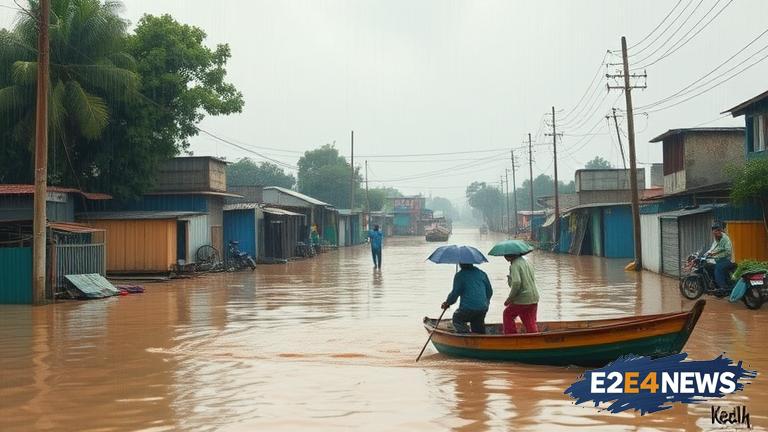The recent monsoon rains in Karachi have brought to the forefront the city’s long-standing issues with flooding and water management. While climate change is often cited as a major contributor to the problem, experts argue that bad governance and inadequate infrastructure are more significant factors. The city’s drainage system, which was designed to handle a certain amount of rainfall, is often overwhelmed during heavy downpours, resulting in widespread flooding. This is not just a matter of heavy rainfall, but also of poor urban planning and lack of investment in critical infrastructure. The government’s failure to address these issues has led to a situation where even moderate rainfall can cause significant disruptions to daily life. The people of Karachi are forced to endure flooded streets, power outages, and water shortages, which can have serious consequences for their health and well-being. Furthermore, the economic impact of these floods should not be underestimated, as businesses and industries are often forced to shut down, resulting in significant losses. The root cause of the problem lies in the lack of effective governance and coordination between different government agencies. The city’s administration has been criticized for its slow response to the crisis, and its inability to implement long-term solutions. In addition, the lack of transparency and accountability in government decision-making has led to a situation where funds allocated for infrastructure development are often misused or diverted. The consequences of this mismanagement are far-reaching, and can be seen in the city’s crumbling infrastructure, including its roads, bridges, and public transportation systems. The government’s reliance on short-term solutions, such as temporary repairs and patchwork fixes, has only served to exacerbate the problem. What is needed is a comprehensive and sustainable approach to addressing the city’s infrastructure needs, one that takes into account the long-term consequences of climate change and the needs of the city’s growing population. This will require significant investment in critical infrastructure, including the city’s drainage system, as well as a commitment to transparency and accountability in government decision-making. The people of Karachi deserve better, and it is time for the government to take responsibility for its failures and work towards finding a solution to this crisis. The international community also has a role to play in supporting the government’s efforts to address this issue, through the provision of technical assistance and funding for critical infrastructure projects. Ultimately, the solution to Karachi’s monsoon woes will require a coordinated effort from all stakeholders, including the government, civil society, and the private sector. By working together, it is possible to create a more resilient and sustainable city, one that is better equipped to handle the challenges of climate change and rapid urbanization. The government must take a proactive approach to addressing the city’s infrastructure needs, rather than simply reacting to crises as they arise. This will require a fundamental shift in the way that the government approaches urban planning and development, one that prioritizes the needs of the city’s residents and the long-term sustainability of the city’s infrastructure. The people of Karachi are waiting for a solution to this crisis, and it is time for the government to deliver. The city’s future depends on it, and the government must take immediate action to address the root causes of the problem. The consequences of inaction will be severe, and will only serve to further exacerbate the city’s already significant challenges. The government must work to create a more transparent and accountable system of governance, one that is responsive to the needs of the city’s residents and prioritizes their well-being. This will require significant reforms, including the establishment of independent oversight bodies and the implementation of more effective accountability mechanisms. The government must also work to address the city’s significant infrastructure deficits, including the lack of adequate drainage and sanitation systems. This will require significant investment, but it is essential to creating a more sustainable and resilient city. The people of Karachi deserve a better future, one that is free from the threats of flooding and water-borne diseases. It is time for the government to take action, and to work towards creating a more livable and sustainable city for all its residents.
